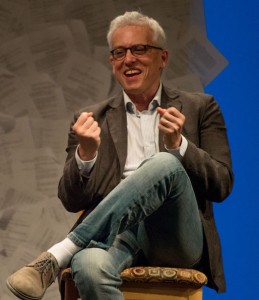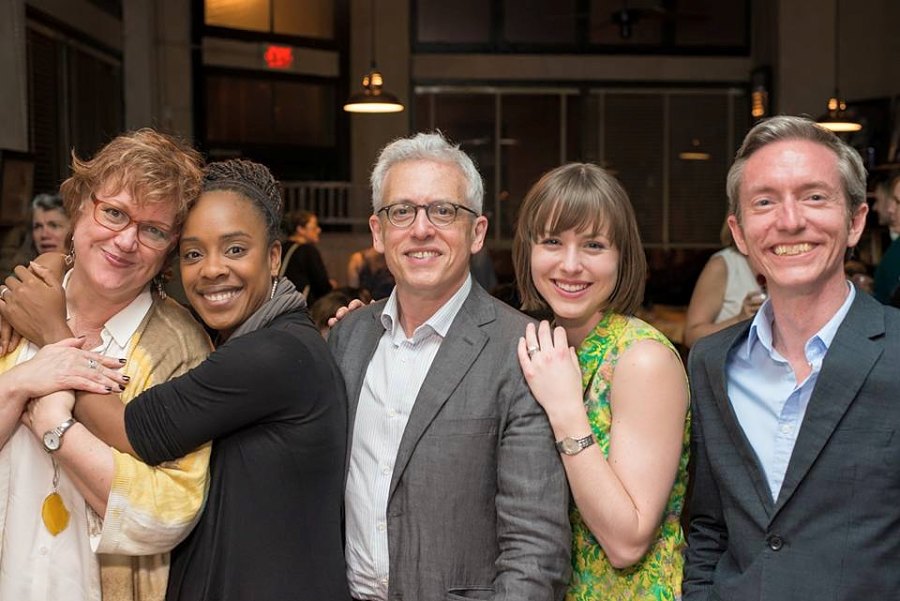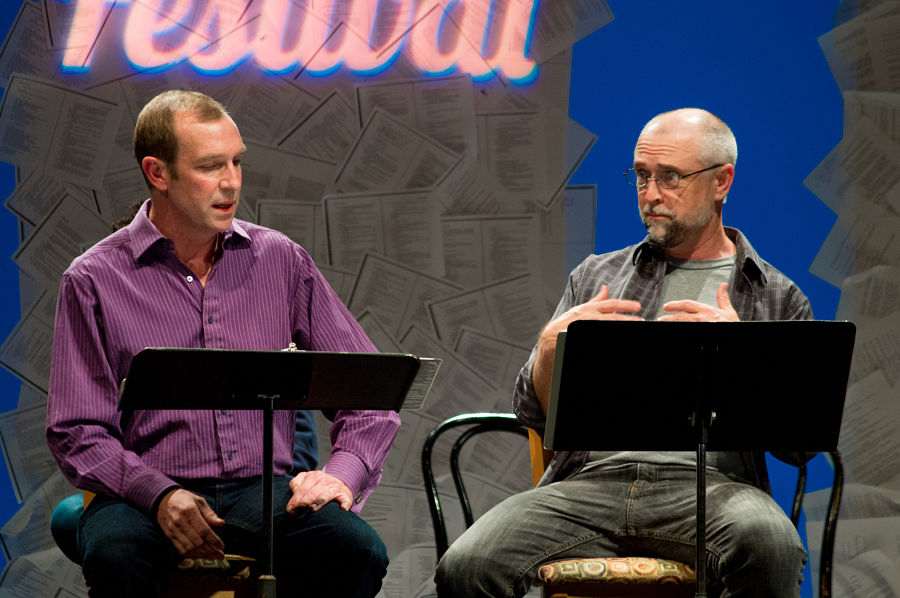NASHVILLE: “I’m walking a tightrope here as a dramatist,” said Donald Margulies, perching on the edge of a stool after a public play reading in a high-ceilinged TV studio. “I honestly don’t know where it’s going.”
The “it” in question is the embryo—with 45 minutes and three scenes, you could barely call it a draft—of a new play, Long Lost, that Margulies only began writing two weeks before he handed it to four Tennessee actors to present for a paying audience over two nights as part of Nashville Repertory Theatre’s Ingram New Works Festival. This year’s iteration, the festival’s seventh, featured new work by five writers, including Margulies, and ran May 6–16 on a soundstage at Nashville Public Television.
Margulies’s reading was indeed a high-wire act of daring, not only for the Pulitzer-winning playwright of Dinner With Friends, Sight Unseen and Time Stands Still to publicly share his work at such an early stage, but also for Nashville Rep, whose previous invited fellows—nationally recognized playwrights who help mentor a group of earlier-career writers in a months-long lab, then present their work alongside them in a spring gathering—have typically brought full drafts of plays to the festival. At last year’s Ingram fest, for instance, Doug Wright presented his play about Henrik Ibsen, Posterity, which recently played at New York City’s Atlantic Theater Company; in 2011, John Patrick Shanley tried out an early version of Storefront Church at the Ingram fest before bringing it to New York (also to the Atlantic).

Though he confessed some anxiety about the prospect of sharing a project so early in its gestation, Margulies need not have worried. A play about a long-overdue reunion between two middle-aged brothers, Long Lost already looks equal parts funny and unsettling, and it was acted superlatively by a quartet of Nashville actors headed by David Alford, a local powerhouse who trained at Juilliard and has a recurring role on the ABC series “Nashville.”
And by handing over a barely begun draft to fine local actors, Margulies perhaps inadvertently highlighted one of the Ingram lab’s unique strengths—that its young writers start their plays from scratch in the program and develop them over a school year’s length, from October to May. The program is not an intensive, a master-class, a retreat or a workshop, though it has aspects of all those models. Playwright Tori Keenan-Zelt, whose surreal-estate comedy Air Space was developed at the lab this past year, compared Ingram to similar programs at New York’s Lark Play Development Center, though that organization is not part of a regular producing company, as is Nashville Rep.
Indeed, the Ingram lab and its culminating festival seem to have brewed up something of a special new-play sauce, and the playwrights who’ve come through it—including not only the lab writers but the fellows—have become its greatest advocates. Margulies, for one, said it was last year’s fellow, Wright, who insisted he give Nashville a try, and he’s certainly likely to talk up the program to colleagues.
“I haven’t shut up about it to my friends,” added playwright Bianca Sams, singling out for special praise “that it’s ‘word one'”—i.e., a seedling-to-sapling process, in which the Rep commissions lab writers based on pitches, not full drafts. The past year’s lab helped Sams turn a pile of historical research into Simply Bess, about actors in a U.S.-sponsored tour of Porgy and Bess in the 1950s. “It really was so amazing to be able to take a play idea that was only a concept and research this time last year, and now I have a meaty first draft.”
The lab’s biggest cheerleader, though, would have to be its leader, Nate Eppler, who is also the Rep’s resident playwright and one-man in-house literary department. Eppler, an irrepressibly enthusiastic livewire with an Ichabod Crane profile and a hearty laugh, started as an Ingram lab playwright in 2009 before joining the company to help run the lab. This past year he was among the four lab writers, with his Tonya Harding–inspired comedy The Ice Treatment closing out the festival readings.
“I’m hesitant to say we’re the only one like this,” Eppler said in an interview at the Rep’s offices, located in the same building as Nashville Public Television. “There are a lot of new-play programs at regional theatres of commensurate size to ours around the country. But my experience with others I’ve done is that you travel to a theatre, and they know you and that one play a little bit, and you meet some strangers who are actors who work on that play, and then you kind of go away. Over time you may build a relationship with that theatre, but not necessarily with their artistic community or their audience.”
In the Ingram lab, though, writers visit Nashville nine times between September and May and work with local actors to construct their plays. At the midpoint, in January, they are menant to have something approaching a full draft to show in the “symposium”—a sort of week-long master class with the Ingram fellow. This year it was Margulies, who came to Nashville to give feedback on the lab plays and appear at a public reading of Dinner With Friends. Though he already had a large-scale professional commission on his plate (a stage musical of the film Father of the Bride for Disney), his experience at the symposium inspired Margulies to join the lab writers in the sandbox and write something new for the actors. (It probably isn’t a coincidence that nearly the entire cast of that Dinner With Friends reading also appeared in the new Long Lost).
For the other writers, the repeated visits, Eppler said, can make writers “feel like they’re part of the artistic fabric of Nashville.”
That fabric has acquired a greater sheen in recent years, with an influx of new residents, most in the so-called creative class, driving up real estate prices and giving this Music City capital a growing bourgeois/hipster/foodie culture.
“There’s an unusual influx of people into Nashville right now,” said Eppler, who estimated that “somewhere between 70 and 80 people a day are moving to Nashville, and they’re looking for these kinds of experiences. We’ve found an increase in audience.”

He means an audience not only for the new works festival but for the Rep’s entire five-play season, which they offer at the unfortunately named Andrew Johnson Theater, a 264-seat-capacity black box within the lavish Tennessee Performing Arts Center in downtown Nashville. The Ingram New Works Festival, though not an official season offering, is now firmly ensconced as a sort of cap or encore to the Rep’s regular programming. And it’s led to a fresh focus on new plays in the Rep’s mainstage season: Eppler’s Larries emerged from the lab into the Rep’s season in 2013, and his Good Monsters, a favorite at least year’s lab, is slated for the coming season.
The commitment to new work, said Nashville Rep artistic director Rene Copeland, began as “more like an intellectual decision: We should do this, it’s important—we should participate in contributing to our field in a positive way in addition to the way we serve our audiences.” But once the program started bringing playwrights to Nashville and midwifing their plays, Copeland began to see the new-play efforts as “an incredibly exciting way to connect with audiences. The idea of coming into a room with us, hearing a play read and getting a chance to talk about it, has been really exciting for our core constituency.” That excited constituency includes Rep staff and artists: “There’s a real invigorating quality about it—you get involved in new work and it keeps you on your toes. It’s a way to feel connected to your art, to really be part of actually creating something from scratch.”
The woman who gave the lab and festival its name is Martha Rivers Ingram, a storied local philanthropist who has put the largesse of her and her late husband’s publishing and shipping empire at the service of Nashville’s arts community. She was instrumental in getting the lavish performing arts center (TPAC for short) built in 1980, and has been integral in shoring up all of its resident companies, from the symphony to the opera to the theatre, which until last year was called Tennessee Rep. And she’s been funding the Rep’s new-works efforts in some form or another to the tune of $50,000 each year since 2007 (the Ingram New Works Lab as it’s currently constituted began in 2009). Next year the National Endowment for the Arts will kick in another $10,000 to help with playwrights’ travel expenses and pay more to the actors.
“I have a feeling that any area of life can become irrelevant if there are not new things,” said Ingram, a gracious but vigorous woman in her late 70s, in an interview at her nautical-themed office overlooking the city. “So why not new plays, new symphonies, new opera, modern dance?”

Of course, Nashville is mostly associated not with fostering the lively arts but with churning out country music (though, as “Dylan, Cash and the Nashville Cats,” a breathtaking current exhibit at the Country Music Hall of Fame, illustrates, it has been a seedbed of adventurous rock and pop long before Jack White took up residence). Eppler admitted that Nashville is not yet a place where theatre artists can sustain themselves full-time doing theatre, though there are a handful of companies in town—including Studio Tenn, Nashville Shakespeare Festival and Nashville Children’s Theatre (run by Rene Copeland’s husband, Scott Copeland)—where actors can piece together work.
But Eppler said he sees the potential for growth, not only in the tide of newcomers but in the city’s most renowned traditions.
“I really do think this is a city of storytellers, and that Nashville tradition is legit—I don’t think that’s just fancy sales language,” said Eppler. “That’s exciting to be around. Our city really likes what’s hip, and I think new plays are always hip. There’s no way we could have built an appetite for that; it must have already been there, and we started serving it, and both of those rose together.”
For Gabrielle Sinclair, a North Carolina–based writer who gestated a pregnancy-themed play, Showing, in the lab (and who gave birth to an actual baby just yesterday—huzzah!), found the process “a pretty ideal setup for what playwriting can be. We’re alone for a lot of it, and ultimately what is created comes from the words on the page,” but the “precious handfuls of days each month, in this bright, magical world of Nashville Rep, were like coming up out of the writing cave.”
Those visits to Tennessee’s hilly capital, though, weren’t just love-fests. Echoing Margulies’s tightrope analogy, Sinclair said that the lab drew from her “more honest, more personal and more dangerous writing than I had even remotely planned.”
Call it the Nashville surprise: Come to Music City for the barbecue and the bluegrass, leave with a new play on the brain.


